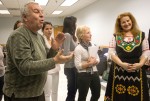Superdevoiche simply began as a class in the ethnomusicology department but has attracted many more members in the past few years through its ability to connect multiple cultures.
This evening, UCLA’s Balkan women’s choir Superdevoiche, comprised of students, alumni and community members, will accompany the “Resplendent Dress from Southeastern Europe: A History in Layers” exhibition in the Fowler Museum as a part of the Fowler Out Loud concert series. This will be its fourth time participating in the series.
Led by Bulgarian singer, choral conductor and UCLA professor of Bulgarian folk music Tzvetanka Varimezova, Superdevoiche offers traditional Balkan songs in close harmony backed by instrumentals.
Since 2001, Superdevoiche, which translates from Bulgarian into English as “super girl,” has comprised of female members, all ranging from ages 17 to 26.
“Although many of my students participate in the choir because of my class in the ethnomusicology department, there are many others who participate,” Varimezova said. “And I often say (participation in the choir) is not just for credits or a grade; it’s about the experience of learning new music and cultures.”
Varimezova said this aspect of learning and mixing new cultures is exactly what makes the sounds of the Balkan ensemble ideal accompaniment for the “Resplendent Dress” exhibition, which will display 19th to 20th century ensembles from countries such as Macedonia, Croatia, Bulgaria, Hungary and the Czech Republic.
She said people will see the exhibition and will be able to make a direct connection to the music, because the music is an important aspect of the culture of Southeastern Europe.
Ryan Koons, ethnomusicology graduate student and Superdevoiche’s accompanying violinist, said historically, many Bulgarian vocal groups used to sing folk songs in the traditional festive ensembles that will be showcased tonight.
Each of the songs is focused on a separate folk story or situation from different regions in Europe.
Koons said one song featured in the program is “Skarali Mi Sa” from Sliven, which is about two women who argue over the possession of a male’s shirt, one believing it to be her husband’s and the other her brother’s, only to foolishly discover it belongs to the same man.
Varimezova said that a few songs like “Skarali Mi Sa” were chosen to be entertaining, as they highlight the lively facet of Bulgarian culture.
The song will include a three-voice arrangement a cappella in which the second and third voices evolve into a literal argument with a melody line that increasingly speeds up, ultimately emphasizing the humor in the argument.
“It’s a very funny song in which the vocal instruments really dramatize the fight, but the image Professor Varimezova is really trying to get us to create vocally is utter comedy,” Koons said.
Some songs in the program like “Skarali Mi Sa” are performed in a humorous manner to parallel the playfulness found in certain stories or situations in Bulgarian culture. However, there are others dealing with more serious issues included in Superdevoiche’s repertoire.
In addition to encouraging students to explore new cultural realms, Varimezova said she also loves teaching songs from all folk origins such as Trace and Estrandja, which will be among the ones featured in tonight’s performance.
“Although they’re all sung in Bulgarian, we chose a variety of different songs because we think the diversity will keep the audience interested,” she said. “We have songs that are humorous, some that are catchy and include talking parts and some that are in different rhythms.”
Alyssa Mathias, graduate ethnomusicology student and second-year member of Superdevoiche, said a large portion of the music is danceable, while simultaneously showcasing new vocal styles and instruments.
“Although the songs are in a completely foreign language to much of our audience, there are songs that hopefully will have the audience dancing and clapping to,“ Varimezova said.
Varimezova said despite singing in a foreign language, Superdevoiche ultimately represents the universality in music through their diverse selection of songs and the emotional connections portrayed in them.
“Music is ultimately a special language,” Varimezova said. “Superdevoiche and our songs will hopefully not only speak to the audience but excite and resonate with them.”
